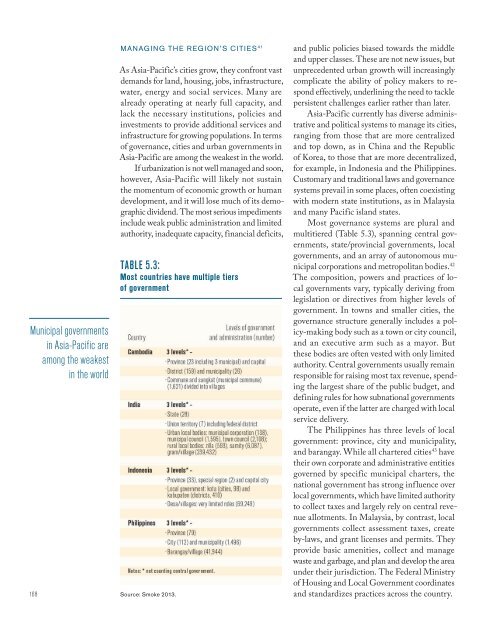SHAPING THE FUTURE HOW CHANGING DEMOGRAPHICS CAN POWER HUMAN DEVELOPMENT
1VPo4Vw
1VPo4Vw
You also want an ePaper? Increase the reach of your titles
YUMPU automatically turns print PDFs into web optimized ePapers that Google loves.
Municipal governments<br />
in Asia-Pacific are<br />
among the weakest<br />
in the world<br />
168<br />
MANAGING <strong>THE</strong> REGION’S CITIES 41<br />
As Asia-Pacific’s cities grow, they confront vast<br />
demands for land, housing, jobs, infrastructure,<br />
water, energy and social services. Many are<br />
already operating at nearly full capacity, and<br />
lack the necessary institutions, policies and<br />
investments to provide additional services and<br />
infrastructure for growing populations. In terms<br />
of governance, cities and urban governments in<br />
Asia-Pacific are among the weakest in the world.<br />
If urbanization is not well managed and soon,<br />
however, Asia-Pacific will likely not sustain<br />
the momentum of economic growth or human<br />
development, and it will lose much of its demographic<br />
dividend. The most serious impediments<br />
include weak public administration and limited<br />
authority, inadequate capacity, financial deficits,<br />
TABLE 5.3:<br />
Most countries have multiple tiers<br />
of government<br />
Source: Smoke 2013.<br />
and public policies biased towards the middle<br />
and upper classes. These are not new issues, but<br />
unprecedented urban growth will increasingly<br />
complicate the ability of policy makers to respond<br />
effectively, underlining the need to tackle<br />
persistent challenges earlier rather than later.<br />
Asia-Pacific currently has diverse administrative<br />
and political systems to manage its cities,<br />
ranging from those that are more centralized<br />
and top down, as in China and the Republic<br />
of Korea, to those that are more decentralized,<br />
for example, in Indonesia and the Philippines.<br />
Customary and traditional laws and governance<br />
systems prevail in some places, often coexisting<br />
with modern state institutions, as in Malaysia<br />
and many Pacific island states.<br />
Most governance systems are plural and<br />
multitiered (Table 5.3), spanning central governments,<br />
state/provincial governments, local<br />
governments, and an array of autonomous municipal<br />
corporations and metropolitan bodies. 42<br />
The composition, powers and practices of local<br />
governments vary, typically deriving from<br />
legislation or directives from higher levels of<br />
government. In towns and smaller cities, the<br />
governance structure generally includes a policy-making<br />
body such as a town or city council,<br />
and an executive arm such as a mayor. But<br />
these bodies are often vested with only limited<br />
authority. Central governments usually remain<br />
responsible for raising most tax revenue, spending<br />
the largest share of the public budget, and<br />
defining rules for how subnational governments<br />
operate, even if the latter are charged with local<br />
service delivery.<br />
The Philippines has three levels of local<br />
government: province, city and municipality,<br />
and barangay. While all chartered cities 43 have<br />
their own corporate and administrative entities<br />
governed by specific municipal charters, the<br />
national government has strong influence over<br />
local governments, which have limited authority<br />
to collect taxes and largely rely on central revenue<br />
allotments. In Malaysia, by contrast, local<br />
governments collect assessment taxes, create<br />
by-laws, and grant licenses and permits. They<br />
provide basic amenities, collect and manage<br />
waste and garbage, and plan and develop the area<br />
under their jurisdiction. The Federal Ministry<br />
of Housing and Local Government coordinates<br />
and standardizes practices across the country.


